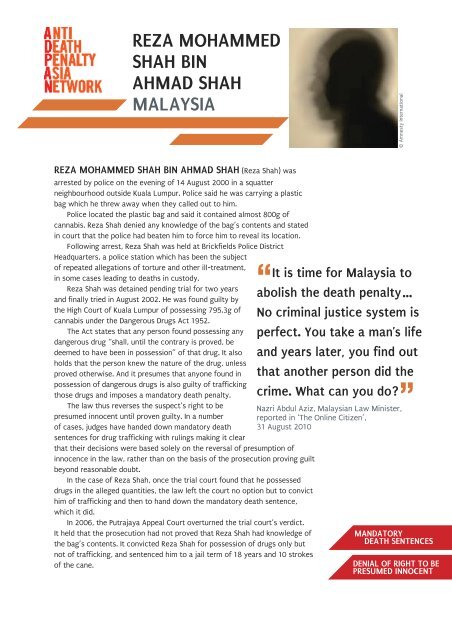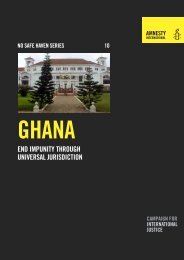Injustice - Amnesty International Schweiz
Injustice - Amnesty International Schweiz
Injustice - Amnesty International Schweiz
You also want an ePaper? Increase the reach of your titles
YUMPU automatically turns print PDFs into web optimized ePapers that Google loves.
REZA MOHAMMED<br />
SHAH BIN<br />
AHMAD SHAH<br />
MALAYSIA<br />
© <strong>Amnesty</strong> <strong>International</strong><br />
REZA MOHAMMED SHAH BIN AHMAD SHAH (Reza Shah) was<br />
arrested by police on the evening of 14 August 2000 in a squatter<br />
neighbourhood outside Kuala Lumpur. Police said he was carrying a plastic<br />
bag which he threw away when they called out to him.<br />
Police located the plastic bag and said it contained almost 800g of<br />
cannabis. Reza Shah denied any knowledge of the bag’s contents and stated<br />
in court that the police had beaten him to force him to reveal its location.<br />
Following arrest, Reza Shah was held at Brickfields Police District<br />
Headquarters, a police station which has been the subject<br />
of repeated allegations of torture and other ill‐treatment,<br />
in some cases leading to deaths in custody.<br />
Reza Shah was detained pending trial for two years<br />
and finally tried in August 2002. He was found guilty by<br />
the High Court of Kuala Lumpur of possessing 795.3g of<br />
cannabis under the Dangerous Drugs Act 1952.<br />
The Act states that any person found possessing any<br />
dangerous drug “shall, until the contrary is proved, be<br />
deemed to have been in possession” of that drug. It also<br />
holds that the person knew the nature of the drug, unless<br />
proved otherwise. And it presumes that anyone found in<br />
possession of dangerous drugs is also guilty of trafficking<br />
those drugs and imposes a mandatory death penalty.<br />
The law thus reverses the suspect’s right to be<br />
presumed innocent until proven guilty. In a number<br />
of cases, judges have handed down mandatory death<br />
sentences for drug trafficking with rulings making it clear<br />
that their decisions were based solely on the reversal of presumption of<br />
innocence in the law, rather than on the basis of the prosecution proving guilt<br />
beyond reasonable doubt.<br />
In the case of Reza Shah, once the trial court found that he possessed<br />
drugs in the alleged quantities, the law left the court no option but to convict<br />
him of trafficking and then to hand down the mandatory death sentence,<br />
which it did.<br />
In 2006, the Putrajaya Appeal Court overturned the trial court’s verdict.<br />
It held that the prosecution had not proved that Reza Shah had knowledge of<br />
the bag’s contents. It convicted Reza Shah for possession of drugs only but<br />
not of trafficking, and sentenced him to a jail term of 18 years and 10 strokes<br />
of the cane.<br />
“<br />
It is time for Malaysia to<br />
abolish the death penalty…<br />
No criminal justice system is<br />
perfect. You take a man’s life<br />
and years later, you find out<br />
that another person did the<br />
crime. What can you do ”<br />
Nazri Abdul Aziz, Malaysian Law Minister,<br />
reported in ‘The Online Citizen’,<br />
31 August 2010<br />
MANDATORY<br />
DEATH SENTENCES<br />
DENIAL OF RIGHT TO BE<br />
PRESUMED INNOCENT
















